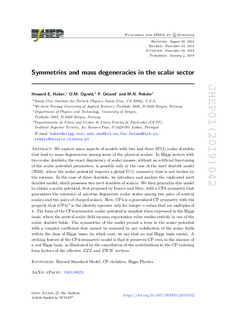| dc.contributor.author | Haber, Howard E. | |
| dc.contributor.author | Øgreid, Odd Magne | |
| dc.contributor.author | Osland, Per | |
| dc.contributor.author | Rebelo, Margarida N. | |
| dc.date.accessioned | 2019-06-06T10:26:42Z | |
| dc.date.available | 2019-06-06T10:26:42Z | |
| dc.date.created | 2019-01-24T19:38:08Z | |
| dc.date.issued | 2019 | |
| dc.identifier.citation | Haber, H. E., Ogreid, O. M., Osland, P., & Rebelo, M. N. (2019). Symmetries and mass degeneracies in the scalar sector. Journal of High Energy Physics, 2019(1). | nb_NO |
| dc.identifier.issn | 1029-8479 | |
| dc.identifier.uri | http://hdl.handle.net/11250/2600114 | |
| dc.description.abstract | We explore some aspects of models with two and three SU(2) scalar doublets that lead to mass degeneracies among some of the physical scalars. In Higgs sectors with two scalar doublets, the exact degeneracy of scalar masses, without an artificial fine-tuning of the scalar potential parameters, is possible only in the case of the inert doublet model (IDM), where the scalar potential respects a global U(1) symmetry that is not broken by the vacuum. In the case of three doublets, we introduce and analyze the replicated inert doublet model, which possesses two inert doublets of scalars. We then generalize this model to obtain a scalar potential, first proposed by Ivanov and Silva, with a CP4 symmetry that guarantees the existence of pairwise degenerate scalar states among two pairs of neutral scalars and two pairs of charged scalars. Here, CP4 is a generalized CP symmetry with the property that (CP4)n is the identity operator only for integer n values that are multiples of 4. The form of the CP4-symmetric scalar potential is simplest when expressed in the Higgs basis, where the neutral scalar field vacuum expectation value resides entirely in one of the scalar doublet fields. The symmetries of the model permit a term in the scalar potential with a complex coefficient that cannot be removed by any redefinition of the scalar fields within the class of Higgs bases (in which case, we say that no real Higgs basis exists). A striking feature of the CP4-symmetric model is that it preserves CP even in the absence of a real Higgs basis, as illustrated by the cancellation of the contributions to the CP violating form factors of the effective ZZZ and ZWW vertices. | nb_NO |
| dc.language.iso | eng | nb_NO |
| dc.publisher | Taylor & Francis | nb_NO |
| dc.rights | Navngivelse 4.0 Internasjonal | * |
| dc.rights.uri | http://creativecommons.org/licenses/by/4.0/deed.no | * |
| dc.subject | beyond standard model | nb_NO |
| dc.subject | CP violation | nb_NO |
| dc.subject | Higgs physics | nb_NO |
| dc.title | Symmetries and mass degeneracies in the scalar sector | nb_NO |
| dc.type | Journal article | nb_NO |
| dc.type | Peer reviewed | nb_NO |
| dc.description.version | publishedVersion | nb_NO |
| dc.rights.holder | © The Author(s) 2019. | nb_NO |
| dc.subject.nsi | VDP::Matematikk og Naturvitenskap: 400::Fysikk: 430 | nb_NO |
| dc.source.pagenumber | 55 | nb_NO |
| dc.source.volume | 2019 | nb_NO |
| dc.source.journal | Journal of High Energy Physics (JHEP) | nb_NO |
| dc.source.issue | 42 | nb_NO |
| dc.identifier.doi | 10.1007/JHEP01(2019)042 | |
| dc.identifier.cristin | 1664765 | |
| cristin.unitcode | 203,12,4,0 | |
| cristin.unitname | Institutt for data- og realfag | |
| cristin.ispublished | true | |
| cristin.fulltext | original | |
| cristin.qualitycode | 2 | |

